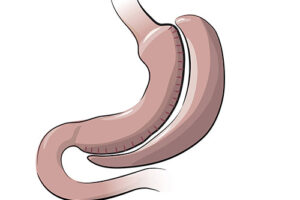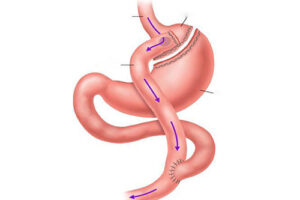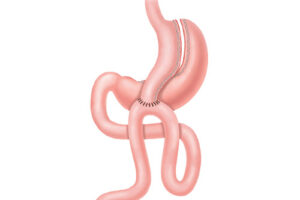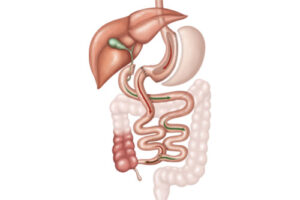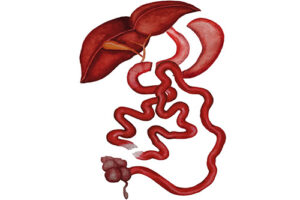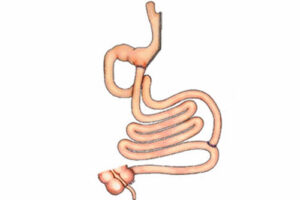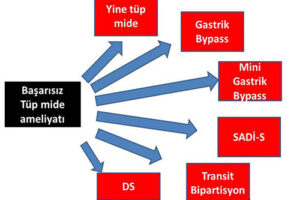Gastric by-pass is mainly a process that restricts both food intake and absorption of food. During the operation, a small stomach pouch as a matchbox is created in the stomach part, which is the continuation of the esophagus, in the upper part of the stomach, using metal staples. Then the small intestine is calculated and cut from the distance found. The cut intestine thus has two ends. One is a short leg from which bile and pancreatic fluids come out, and the second is a long leg where food will go into the large intestine. Stomach pouch is mouthed with a long small intestine tip. In other words, after the small stomach like a matchbox is formed, this tiny stomach pouch is combined with the long end of the small intestine by opening a window so that the food coming here can pass into the intestines. The short intestinal end (carrying stomach, pancreatic secretions and bile fluid) is brought to a distance calculated from the place where the distal end is mouthed with the stomach and mouthed.
Gastric Bypass surgery has two main goals:
1. Shrinking stomach volume
2. Restricting absorption.
This reduces the amount of foods you eat after surgery, and at the same time, some of the foods taken are thrown away without being absorbed.

The main effect of the surgery is to reduce the amount of food taken and suppress appetite. Since there is a small stomach pouch after eating a few bites, the stomach fills up quickly and provides fullness for a long time in the patient. The bypass part of the stomach and intestines area, the intestines do not take part in the absorption of nutrients. But for this reason, the absorption of proteins, vitamins and minerals also decreases. For this reason, he may have to take some medications such as Calcium, Iron and multi-vitamins for life. These patients therefore require strict follow-up (once a month for the first 6 months, then every 2 months).
Who should have the surgery?
Gastric Bypass surgery can be applied to all patients who cannot lose weight with diet and exercise. BMI plays an important role in deciding this. It can be said that gastric bypass surgery will be appropriate under the following conditions:
✓ Those with a Body Mass Index of more than 40
✓ Those whose BMI is greater than 35 and has 2 of the following obesity-related findings
- Diabetes
- Hypertension
- Sleep apnea
- Heart disease
- Those with diseases such as polycystic ovary etc.
- Those whose body mass index is over 35 kg / m2 and who cannot lose weight despite any diet or exercise.
- Those with other obesity-related diseases.
In this period, our first goal is to reduce our swollen and fatty liver to a healthier level in our normal nutritional process, therefore, we should completely remove fat and sugar from our nutrition table and follow a diet as high as possible in terms of protein, vitamins and minerals.
The main rules you must follow before surgery;


✓ You should consume 2500- 3000 cc of water a day.
✓ You should not drink acidic drinks.
✓ You should have a protein-based diet in all your meals.
✓ You should not especially use refined sugar.
✓ If you are smoking, you should spend this period with as little cigarettes as possible, even with supports such as nicotine patch or nicotine gum.
✓ One week before your surgery, Aspirin and its derivatives, Coraspin Alcaseltzer etc. You should not use blood thinners.
✓ There are no solid foods in your diet. So you should stop using your teeth.
✓ You should not take any starchy or sugary foods that will increase your insulin suddenly.
✓ Putting a glass of cinnamon in cinnamon in the morning and starting the day with light milk will prevent your appetite from rising suddenly during the day and is a good protein support.
✓ You can rondo and drink a tablespoon of lightlabne cheese or milky cottage cheese unshelled tomato with a few leaves of basil at breakfast, sorry no bread.
✓ In other meals, you can boil the lean meat as much as the hand with the vegetables at home in a pressure cooker, season it with your favorite spices after roasted and drink it unlimitedly during the day as you need it, or you can consume your favorite soups with broth.
✓ As herbal tea for snacks; You can drink herbal teas such as rosemary, heather, nettle leaves, green tea, thyme, and fennel.
✓ You can drink ayran one or two hours before going to bed at night.
✓ You are entitled to a glass of freshly squeezed fruit juice a day for your sugar needs. You can take it at any meal you want.
✓ You should not consume solid food and beverages at the same time.
✓ You should not consume acidic drinks.
✓ You should avoid foods containing refined sugar as much as possible.
✓ We recommend obtaining a 120/150 cc sized glass in order to keep the amount of meals constant after surgery.
✓ You should make it a habit to drink a big sip of water every 10 minutes to meet your water needs. You should not choose a straw when consuming liquids. When you drink it with a straw, you may not be able to adjust the amount and cause you to swallow air.
✓ During the first month after your operation, you should have a diet consisting mainly of high protein fluids.
✓ You can use protein supplements containing milk, ayran, kefir, soy milk, meat and chicken juices, Whey, Casein, Qnt, Or beef protein.
✓ In the first two weeks, you should be fed with clear liquids that can be seen from one side to the other.
✓ In non-clear liquids such as milk and ayran, you should drink it after making it look more transparent by thinning its consistency.
✓ In case of gas formation, you should prefer lactose-free ones in all your drinks.
✓ You should divide the day into 6 meals. Morning-Mid-morning-afternoon-afternoon-evening-night.
✓ You should start mashed foods by the third week and continue with puree foods until the first month.
✓ You should start a solid diet with low fiber soft foods by the first month.

Prof. Dr. Haluk Recai ÜNALP was born in 1963 in Merzifon. In 1987 he graduated from Ankara GATA Medical Faculty.
Until 1987-1990, Keşan served as the Chief Physician and Health Branch Manager of the 4th Infantry Division, and in 2015 he received the title of Professor.
Until 1987-1990, worked in Keşan as the Chief Physician and Health Branch Manager, and in 2015 he received the title of Professor.
İstanbul İrtibat: +90 (544) 422 32 04
İzmir İrtibat: +90 (544) 422 32 03
Tel: +90 (232) 422 32 02
Eposta: info@halukunalp.com
Lokasyon: Haritaya Gözat

